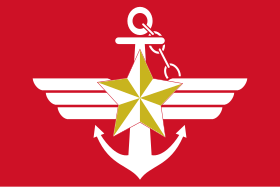South Korean military
| Republic of Korea Armed Forces | |
|---|---|
| 대한민국 국군 大韓民國國軍 Daehanminguk Gukgun |
|

Flag of the Republic of Korea Armed Forces
|
|
| Founded | August 15, 1948 |
| Service branches |
|
| Headquarters | Seoul, South Korea |
| Leadership | |
| Commander-in-Chief | President Moon Jae-in |
| Minister of National Defense | Song Young-moo |
| Chairman of the Joint Chiefs of Staff | General Lee Soon-Jin, ROKA |
| Manpower | |
| Military age | Voluntary from 18, mandatory 20 to 38 years of age for male, wartime conscription 18–40 years of age |
| Conscription | 21–24 months depending on the branch |
| Active personnel | 625,000 (2016) |
| Reserve personnel | 3,100,000 (2016) |
| Deployed personnel |
13 nations, 1,104 troops (2016)
|
| Expenditures | |
| Budget | ₩ 38.8421 trillion (2016) |
| Percent of GDP | 2.40% (2016) |
| Industry | |
| Domestic suppliers |
List of major suppliers
|
| Foreign suppliers |
List of major suppliers |
| Related articles | |
| History |
Korean War (1950–1953) Vietnam War (1964–1973) Persian Gulf War (1991) War in Afghanistan (2001–2014) Iraq War (2003–2008) |
| Ranks |
Military ranks of South Korea Comparative military ranks of Korea |
13 nations, 1,104 troops (2016)
List of major deployment
List of major suppliers
List of major suppliers
The Republic of Korea Armed Forces (Korean: 대한민국 국군; Hanja: 大韓民國國軍; Revised Romanization: Daehanminguk Gukgun, literally "Great Korean Republic National Military") are also known as the ROK Armed Forces, are the armed forces of South Korea. Created in 1948, following the division of Korea, the Republic of Korea Armed Forces is one of the largest standing armed forces in the world with a reported personnel strength of 3,725,000 in 2016 (625,000 active and 3,100,000 reserve). The ROK military forces are responsible for maintaining the sovereignty and territorial integrity of the republic, but often engage in humanitarian and disaster-relief efforts nationwide. More recently the ROK military began increasing its participation in international affairs, acknowledging its role and responsibility as the eleventh economic power in the world in terms of GDP. The ROK military has participated in various peacekeeping operations, and counter-terrorism operations. It is recognized as one of the world and Asia's most professional militaries.
The South Korean armed forces were largely constabulary forces until the outbreak of the Korean War. It was heavily damaged by North Korean and Chinese attacks and in the beginning relied almost entirely on American support for weapons, ammunition and technology. After the Korean War South Korea maintained a large military ground force, which in 1967 had about 585,000 personnel, much larger than the northern forces of about 345,000. During South Korea's period of rapid growth in the 1980s, the military modernised, benefiting from several government-sponsored technology transfer projects and indigenous defense capability initiatives. The GlobalSecurity.org website states that "in 1990 South Korean industries provided about 70 percent of the weapons, ammunition, communications and other types of equipment, vehicles, clothing, and other supplies needed by the military."
...
Wikipedia
